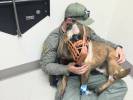Help your pet shed unhealthy weight
(BPT) - Are you killing your pet with kindness? We’re not talking about the compassion that motivates us to vaccinate our pets, or keep them warm in cold weather. Kindness that can be harmful to pets comes in the form of an overabundance of food and treats. The all-too-common result is a pet that becomes overweight or even obese.
A 2012 survey conducted by the Association for Pet Obesity Prevention found 52.5 percent of dogs and 58.3 percent of cats to be overweight or obese by their veterinarian. This translates to nearly 80 million dogs and cats in America with a weight problem. Dr. George Banta, chair of the Veterinary Technology department at Brown Mackie College - Akron and Dr. Mary Jo Wagner, attending veterinarian at Argosy University, Twin Cities, offer useful information for pet owners.
How can you tell if your pet is overweight? “It’s not the number of pounds, it’s how the animal carries the weight,” says Banta. “The number on the Body Condition Score is more important than pounds.” The Body Condition Score offers a way to assess the condition of an animal, usually on a scale from one to five, taking into account height, weight, and relative proportions of muscle and fat.
With a little knowledge, you can use sight and touch to figure your pet’s general condition. “When looking down on a dog or cat from above,” says Banta, “the body should slim to a discernable waist. An animal is too thin if you can see the spine or ribs; however, you should be able to feel them beneath the fur.” An animal of ideal weight will also display a pelvic tuck when viewed from the side.
“Just like humans, when animals overeat, they face increased risk for health problems like diabetes, heart disease, gastrointestinal problems and cancer,” continues Banta. In fact, these risks also include a shortened life expectancy.
Many owners feed pets according to the manufacturer’s suggested amounts; however, this instruction may not be right for your pet. “These guidelines are meant to cover all animals of a certain weight range,” says Wagner. “An owner must consider the age and activity level of each pet. The more active they are, the more calories they will burn in a day.”
Metabolism rates vary in animals the same way they do in people. Metabolism is the body process in which food is broken down for energy; another factor that affects the amount of food a pet needs. Wagner advises owners to keep an eye on body condition to judge whether a pet is eating properly. “If your pet shows signs of being overweight, simply cut back the amount of food given at each meal. Then weigh the pet in two or three weeks to see if it has made a difference,” she says.
Choosing the right food for your pet is important as well. Different brands of pet food contain varying amounts of protein, fat, carbohydrates and calories. “As a general rule, young, active dogs need high protein food,” says Wagner. “Older dogs need higher fiber to keep the gastrointestinal (GI) tract moving.” Ingredients listed on the package appear in descending order of volume; the first item on the list is most abundant in the food.
Most of us love to give treats, but many of us don’t realize how many we offer each day. “A 40-pound dog is one quarter the size of a 160-pound person,” Wagner says. “They have smaller stomachs. Look at calories in everything your pet eats. After that, it’s simple math.”
“Table scraps are a definite no. Zip, zilch, nada,” says Banta. “They are not good for two reasons. First, foods like chocolate, caffeine, grapes and raisins can be toxic to dogs. Second, the high fat content associated with table scraps, especially holiday trimmings, can lead to the onset of acute pancreatitis, which can be fatal.”
He recommends offering a kibble of food or a carrot instead of a cookie. If you must give cookies, try breaking them in half. “Pets do enjoy treats as a reward; however, attention from you is also a reward. It’s important to praise animals. In some ways, spending time with them is better than a treat,” Wagner says.























